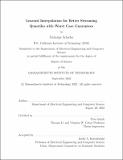Learned Interpolation for Better Streaming Quantiles with Worst Case Guarantees
Author(s)
Schiefer, Nicholas
DownloadThesis PDF (2.594Mb)
Advisor
Indyk, Piotr
Terms of use
Metadata
Show full item recordAbstract
An ε-approximate quantile sketch over a stream of n inputs approximates the rank of any query point q—that is, the number of input points less than q—up to an additive error of εn, generally with some probability of at least 1−1/ poly(n), while consuming o(n) space. While the celebrated KLL sketch of Karnin, Lang, and Liberty achieves a provably optimal quantile approximation algorithm over worst-case streams, the approximations it achieves in practice are often far from optimal. Indeed, the most commonly used technique in practice is Dunning’s t-digest, which often achieves much better approximations than KLL on real-world data but is known to have arbitrarily large errors in the worst case. We apply interpolation techniques to the streaming quantiles problem to attempt to achieve better approximations on real-world data sets than KLL while maintaining similar guarantees in the worst case.
Date issued
2022-09Department
Massachusetts Institute of Technology. Department of Electrical Engineering and Computer SciencePublisher
Massachusetts Institute of Technology